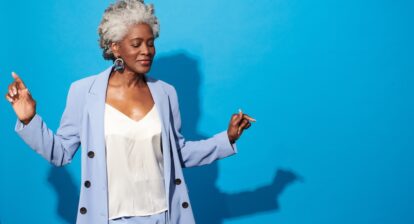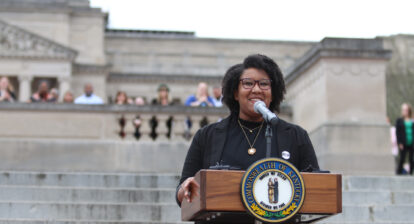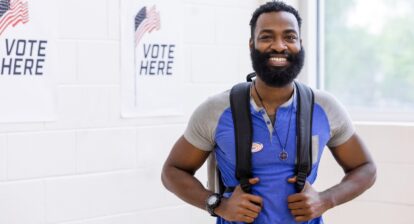
What makes the ultimate gentleman? It’s the finesse and coolness that Black men possess. It’s how we move through the world with fervent command of ancestral strength, setting the tone while others listen and seek to emulate our energy. Collectively defined and individually unique, it’s never duplicated but emanates outward into the lives we touch with the hope that it will live on in legacy.
Sterling K. Brown is this definition personified.
On the day of his April 2025 EBONY cover shoot, his presence fills the room and pulls focus even before he utters a word. Inside the sleek Culver City Smashbox Studio, the smooth sounds of a Motown Soul mix wafted from the speakers. The set’s photographer, Birdie Thompson, noted of the actor, “He doesn’t have to beat his chest… But the confidence is there. Always.”
The crew would go on to echo her sentiments, adding words like charming, disarming, grounded – all undeniable aspects of someone who’s earned the title of being “The Ultimate Gentleman.”
There was no dramatic entrance. No entourage parade. Just a simple hello, paired with direct eye contact and a firm handshake for crew members, or a hug for more familiar faces. His presence pulled focus—not by volume, but by vibration.

“I try to have every interaction be a holy interaction,” Brown tells me early into our conversation. “Namaste, as I understand it, means ‘the God in me sees the God in you.’ That’s how I try to live.”
Each shot taken is punctuated by an array of debonair looks further accented by fitting musical choices: a warm brown Tom Ford two-piece suit with “Worst Comes to Worst” by Dilated Peoples. An olive-green Louis Vuitton set with the spirit-lifting “Joy” (the same gospel track that played during Pharrell’s Louis Vuitton runway debut). A black, sharp-lined Gucci suit and the vibe transitioning into old-school hip-hop, Method Man and Redman’s “Da Rockwilder,” along with tunes to groove to, “Candy Rain” by Soul 4 Real and “Anxiety” by Doechii. It’s “Cupid” by 112 for his final look: a BLUE BLUE JAPAN denim-on-denim fit, full-on luxury Canadian tuxedo vibes.
Brown doesn’t just model the clothes. He commands every outfit through exaggerated posture, striking in contrast to his relaxed demeanor. It becomes crystal clear: Brown is a maestro in motion. And all on the eve of his 49th birthday.

Starting his career in the early 2000s, he appeared on several television shows, including Army Wives from 2007 through 2013. Three years later, he would change the face of primetime television on NBC’s groundbreaking series This Is Us. Brown starred as Randall Pearson, a son adopted into a loving white family, who spent his early years yearning to establish his identity as a Black man and then define himself as a husband and father while finally learning about his own roots. Randall was a man who expressed himself freely: we witnessed his joy and sadness, we saw him navigate anger and anxiety, we felt him grieve, and watched him heal and find salvation. In Brown’s capable hands, he was more than just the provider or protector, or, showcasing the multitude of emotions that often exist within the Black male experience, even when we haven’t been allowed to show it.
In real life, Brown’s approach to manhood and fatherhood is heavily influenced by the man he still calls his hero—his father, Sterling Brown Jr., who passed when Brown was just ten.
“My dad cried. He wasn’t stoic,” Brown reveals with a smile. “That level of affection—that’s what I pass down to my boys.”
For Brown’s father to have left him with such an indelible impression of what it means to be a man at such a young age, it’s no surprise he’s been able to translate that into his life and extensive acting career. From The People v. O.J. Simpson to his popular binge-worthy series Paradise, these complex human emotions are displayed fiercely through Brown’s artistry from episode to episode.

But off-screen? That emotional accessibility isn’t an act; it extends into his 19-year marriage with actress Ryan Michelle Bathe. With divisive commentary on relationships within the Black community, their marriage has become a modern model for Black love. The two now co-host their podcast, We Don’t Always Agree, which was born out of the writers’ strike and a desire to speak honestly about the work that goes into relationships and longevity. It’s a raw, witty and heartfelt look into their union. “People see us on the red carpet and think, ‘goals.’ But chile, please… it takes work. We want to be honest about that,” Brown declared.
Part of that honesty includes the grace they’ve learned to give each other. “You’re not always going to be right. The key is choosing kindness,” he says. “We used to let things linger. Now we apologize faster. We laugh more. We keep choosing each other.”
The way in which Brown speaks of his wife touches on a conversation that’s taken place across the Black communal zeitgeist recently: how does it feel to love a Black woman? But it begs an even bigger question: whether platonically or romantically, do we as Black men affirm our Black women enough?
“Do we affirm Black women enough? No. We need to do better,” Brown says plainly. Granted this sentiment may be a behemoth, but the care and thoughtfulness Brown takes to answer further cements why he’s regarded as being such a gentleman.
“I don’t know exactly what is required for that evolution to progress forward in a way other than [having] grace. It’s not a competition; it’s a coalition. I would love to see us be able to work side by side more and more as time goes on. Love is not merely a feeling. Love is a choice. Who you choose to love says something, whether you want it to or not. Loving a Black woman is one of the most powerful statements that you can make to affirm them. And I’ll leave it at that.”

When asked how he feels about being widely respected for how he maneuvers through his experience as a Black man, Brown doesn’t wear it as a badge of pride—but as a reflection of something deeper. “If I’m receiving gentleman status, then I hope it’s because I’m trying to share my source with whomever I come in contact with.” In a world often driven by bravado, Brown redefines masculinity on his own terms—anchored in vulnerability, authenticity and emotional fluency.
“There’s only one me,” he says with firm humility. “So, don’t worry about how anybody else does it. You are a man. You are in touch with the masculine and feminine sensibilities that exist within yourself. And sharing all of that… that’s sharing yourself in the most authentic way possible.”
It’s another philosophy he’s passing on to his sons, aged 13 and nine. In the Brown household, speaking one’s truth isn’t just allowed—it’s encouraged. “Your voice means something,” he says. “Whether you’re talking to your peers or to adults, speak your mind, you matter.”
It’s this command of leadership that makes him the quintessential leading man. In his latest series Paradise, created by This Is Us’ Dan Fogelman, Brown plays Xavier Collins, a widowed Secret Service agent protecting the President while quietly navigating his own grief. “I didn’t want to repeat myself,” he says, referring to his acclaimed role on This Is Us. “Xavier is different. He’s guarded. Still in mourning. Still questioning if he’s allowed to be happy.”
He isn’t just taking up space on screen with Paradise. As both star and executive producer, he is stepping more deeply into leadership. “I used to shy away from being number one on the call sheet. But now I know God gives you what you need when you need it. My style is about creating a space where everyone feels heard and where people feel free to play… whatever I can do to make sure everybody knows that they are welcome, that whatever they have to say in terms of input is appreciated.”
As Brown defines his place as a leader, he’s also making sure there’s enough room for the next generation to take up their space. “I have things of value to share in terms of my experiences for younger actors to help them feel settled and at ease and ready to play. ‘Cause that’s all it is, man, you’re trying to free up this magical space where you memorize lines and then you have these conversations and hopefully something spontaneous takes place,” he shared. “Sometimes you need permission to do that. I feel like I’m in a place where I’m able to help people be as fully available as possible.”
In essence, Brown is creating opportunities for others to shine their brightest. It’s a marker that he’s not one to steal the spotlight but is gracious enough to share it.
Along with an anticipated MGM Orion feature film, Is God Is on the horizon, Brown’s production company, Indian Meadows Productions, has partnered with Hulu to bring the limited series, Washington Black, to screen. An adaptation of author Esi Edugyan’s third novel and coming to screens this summer, the story revolves around George Washington “Wash” Black, an enslaved man who escapes and becomes a world traveler.
By creating projects with more autonomy, Brown can curate the call sheet on his terms, setting an example for Black men along the way.
“What I am actively trying to do with my energy and with my vibration is make sure that everybody within my sphere feels like there’s space for them,” he shared. “That is something that I am very conscious and purposeful of in the way in which I walk through the world. Because like I said before, I’m just trying to share God, that’s what I got. My goal in life is to be as honest as possible.”

The applications of kindness, a humble cadence, gracious temperament, intentionality in his words and his relationship to God are qualities make Brown who he is.
In asking what he believes Black men should add to their own “Gentleman’s Playbook,” he paused and then offered: “Being a gentleman means more listening than talking… Choose kindness over being right… Be slow to offense… Create space for others to breathe… And make sure your presence lifts the room.”
Spoken like a man who doesn’t just talk about the light—he walks in it.
Mike Gauyo (@b.l.a.c.k.b.o.y.w.r.i.t.e.s) is a TV writer who’s written on shows like the critically acclaimed “Insecure” and Netflix’s hit series, “Ginny and Georgia.” He’s also the founder of the Black Boy Writes & Black Girl Writes mentorship initiate, which is a talent incubator for aspiring Black writers.
EBONY TEAM
Executive Vice President, Content
Candace Rodney – @cjrodney
Executive Director, Editorial
J’nelle Agee – @jnagee30
Director, Editorial
Savannah Taylor – @savmtaylor
Director, Development & Production
Yadira Espinal – @isthatyadira
Director, Social
Selina Smith – @selina.mvriee
Director, Talent
Ashle Mitchell – @ashle_monae
Entertainment & Culture Editor
Delaina Dixon – @delainadixon
Music Editor
Emanuel Okusanya – @kusanye
Writer, Fashion & Beauty
Victor Vaughns – @vqvaughns
Editorial Writer, Brand Solutions
Kristin Morgan – @kayforkrstn
Copy Editor
Jonathan Giles – @jgileswrites
Senior Manager, Social
Kai Bailer – @_kaai
Manager, Social
Gitory Bartell – @gitoriousbig
Manager, Video
Annastacia Gladston – @athenaturalista
Video Shooter/Editor
Dennis Hope – @Lowkey_hope
Senior Graphic Designer
John Bruton – @brutoncreative
Graphic Designer
Tomicha Cassel – @tomicha.design
Coordinator, Content
Simone Walker – @s.im
Coordinator, Editorial
Hayley Mason – @hayleymasontv
Cover Team
Talent
Sterling K. Brown – @sterlingkbrown
Cover Story Writer
Mike Gauyo – @b.l.a.c.k.b.o.y.w.r.i.t.e.s
Photographer
Birdie Thompson – @birds_eye_photo
Executive Producer
David Wept – @davidwept
Line Producer
Morgana Yasmeen – @morganayasmeen
Production Manager
Solana Campbell – @solana.campbell
Assistant Director
Robert “RB” Blair – @cinemacowboy.rb
Digitech
Stephen Panosian – @stephen.panosian
Photo Assistant
Alejandro Sosa – @alesosaoficial
Videographer/Social Video Editor
Abraham Azab – @azabmedia
Production Designer
Taylor Almodovar – @greenhousecreative__
Production Assistants
Zakariya Syed – @zak.01
Kymani West – @westpiccs
Wardrobe Stylist
Chloe Keiko Takayanagi – @chloekeiko
Groomer
Kathy Santiago – @kathypsantiago


















![The Chi Cover Final Cover[63]](https://media.ebony.com/sytwmfsyue/styles/featured-cover/2023/07/19/The-Chi-Cover-Final-Cover63.jpg.webp?t=6f3c7293.webp)


![Hailey Bailey Cover[1]](https://media.ebony.com/sytwmfsyue/styles/featured-cover/2023/05/02/Hailey-Bailey-Cover1.jpg.webp?t=9023d14b.webp)


![Jonathan Majors Retouched Cover eye[1]](https://media.ebony.com/sytwmfsyue/styles/featured-cover/2023/02/05/Jonathan-Majors-Retouched-Cover-eye1.jpg.webp?t=09013075.webp)


![CIARA- 1st cover drop[1]](https://media.ebony.com/sytwmfsyue/styles/featured-cover/2022/09/CIARA-1st-cover-drop1.jpg.webp?t=ee8f21d7.webp)



















